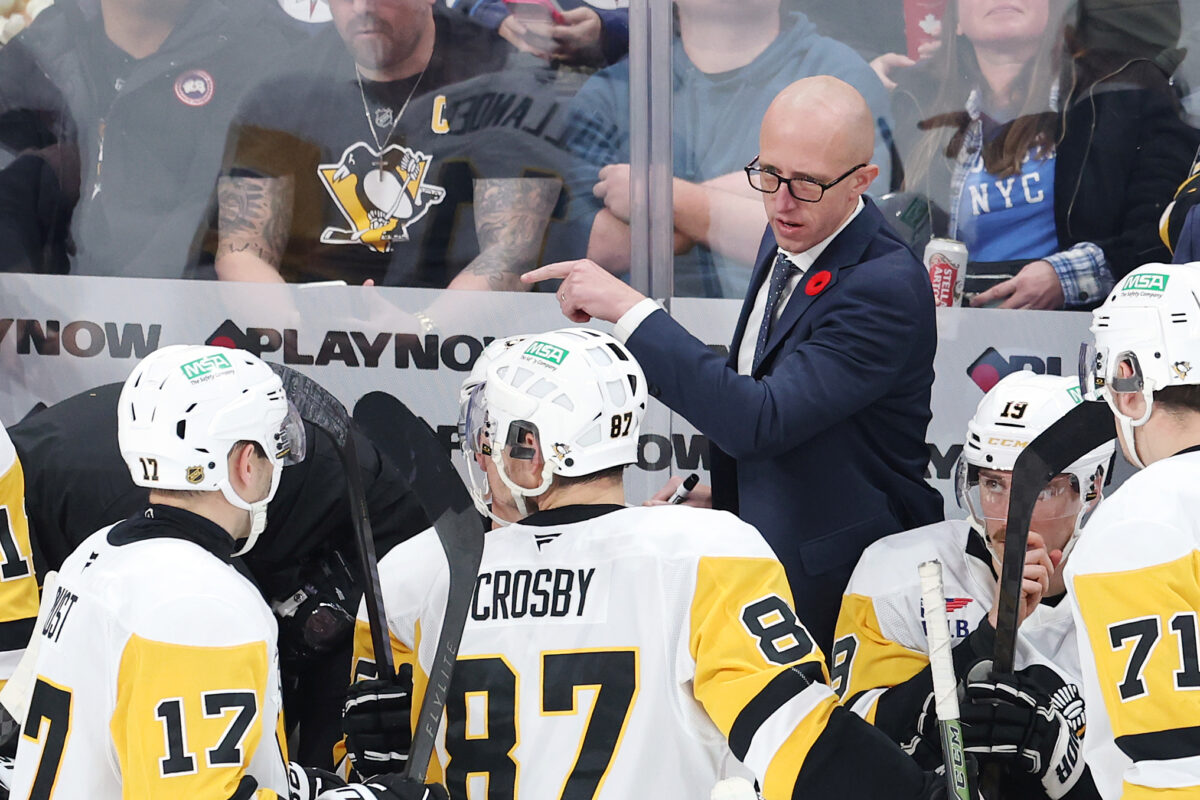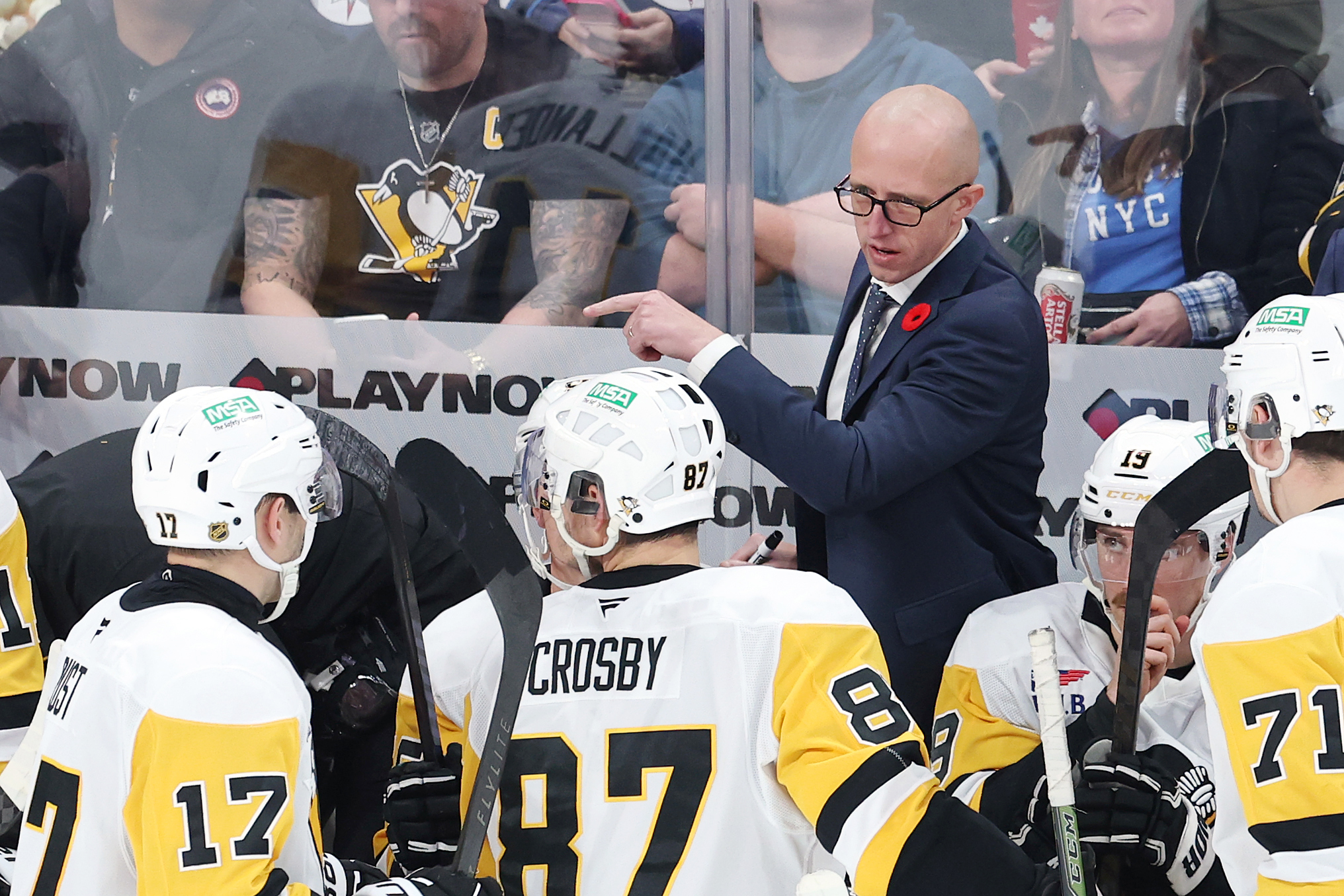For the first month of his tenure as head coach of the Pittsburgh Penguins, Dan Muse has been the picture of composure. He has been described by beat writers and players alike as measured, optimistic, and analytically calm. He is a modern coach—one who typically prefers to teach rather than preach, and who looks for the silver lining in the data even when the scoreboard doesn’t cooperate.
That version of Dan Muse was nowhere to be found on Saturday night.
Following a disheartening 3-2 overtime loss to the Seattle Kraken on Nov. 22, the Penguins’ bench boss delivered what was unequivocally his most pointed message of the season. This wasn’t just frustration; it was a calculated breaking point. Coming off a 5-0 drubbing by the Minnesota Wild the previous night—where he had already reportedly “lit into his group”—Muse didn’t walk back his criticism after a closer contest against Seattle. He doubled down.
Related – Montour’s Overtime Goal Gives Kraken 3-2 Win Over the Penguins
For a team that has surprisingly hung around the playoff conversation despite low preseason expectations, the tone has officially shifted. The “happy to be here” phase is over. Muse is demanding results, and he is demanding them now.
A November to Forget
To understand the flash of anger Muse displayed on Saturday, you have to look at the trajectory of the last three weeks. After an October start that exceeded all projections, the Penguins have hit a wall. November has been, for lack of a better term, a disaster.
The loss to the Kraken marked the team’s fifth defeat in six games and their seventh overall loss in the month. The Penguins are currently sitting with a mediocre 2-4-3 record for November, a slide that has effectively erased the goodwill and standings buffer built during the season’s opening weeks.
Saturday’s loss was particularly stinging because it dropped the Penguins out of a Stanley Cup Playoff spot. In the modern NHL, falling below that red line around American Thanksgiving is often statistically ominous. Muse knows this. He sees a team drifting into a fugue state of “almost good enough,” and he refuses to let complacency take root.
The Death of the “Moral Victory”
The primary source of Muse’s ire wasn’t necessarily the effort level against Seattle—which he admitted was an improvement over the Minnesota debacle—but the acceptance of the outcome.
Against the Kraken, the Penguins did almost everything right on paper. They led in possession metrics, they generated high-danger chances, and they controlled the flow of play for long stretches. In the overtime period alone, they were dominant. Kris Letang rang a shot off the post; Erik Karlsson nearly ended it with a dazzling individual effort.

But they lost.
In his post-game presser, Muse cut off any narrative regarding “bad puck luck.” He made it clear that he is tired of acknowledging positives from games that end in the ‘L’ column.
“One out of four points… is not good enough,” Muse declared, referencing the back-to-back set. “We are past that point. We need to secure points right now. I’m not going to keep coming in here and saying that one point is sufficient.”
This is a critical pivot in messaging. Early in a tenure, a coach will often protect the locker room by focusing on “process.” Muse is signaling that the process is useless if it doesn’t yield production. He is stripping away the safety blanket of “we played well, but…”
The Overtime Crisis
If there is a single statistical anomaly driving this frustration, it is the Penguins’ performance in extra time. Through 21 games, the Penguins are a staggering 0-5 in overtime and shootouts.
For a team on the playoff bubble, that is a mathematical catastrophe. Overtime proficiency is often the difference between a wildcard spot and an early golf season. Muse cited this specifically as a “significant concern” and a “recipe for missing” the postseason.

When Muse says the team “can’t afford to be just giving away points,” he is speaking to the razor-thin margins of the Metropolitan Division. Turning even two of those five OT/SO losses into wins would drastically alter the complexion of the standings. The inability to close out games isn’t just bad luck; at 0-5, it becomes a psychological hurdle and a failure of execution.
Execution Over Effort
Muse’s critique on Saturday drilled down into the “little details.” While he acknowledged the team “outchanced them by a lot” against Seattle, he refused to use that as an excuse.
“It’s about just finishing it,” Muse said. “Having chances is not good enough.”
This is the Catch-22 the Penguins find themselves in. They are generating offense, which suggests the system is working, but they are failing to convert at crucial moments. Whether this is a personnel issue or a focus issue is what Muse needs to solve. He highlighted the need to find ways to generate one more opportunity or to take away one opponent chance.
Related – Penguins May Have Found Future Core Players
It’s a call for professionalism and precision. Muse feels the team is leaving plays on the ice, settling for “good looks” rather than goals.
The Playoff Mandate
Perhaps the most revealing aspect of Saturday’s press conference was Muse’s refusal to hide behind the “rebuild” label. Pundits and fans alike came into the 2025-26 season with tempered expectations for Pittsburgh. It was supposed to be a transition campaign.
Muse evidently didn’t get that memo.
By expressing such raw, honest frustration, Muse is putting a tremendous amount of pressure on his shoulders and on his veteran core. He stated explicitly that he thinks this team should make the playoffs, and he wants this team to make the playoffs. He is not coaching for a draft lottery pick; he is coaching to win.
Demanding the team stay in the race is a bold strategy. It removes the excuse of a talent gap. It tells the locker room that the coaching staff believes in them, but consequently, expects them to deliver.
What Comes Next?
The “calm and complimentary” Muse has left the building, replaced by a coach who sees a season slipping away and is desperately trying to grab the wheel.
The Penguins have a roster that is flawed but capable. However, as Muse correctly pointed out, the NHL waits for no one. The disastrous month of November has removed their margin for error.
The team returns to the ice against the Buffalo Sabres next. We are about to find out how this group responds to being called out. Will they tighten up the details and find that elusive finishing touch? Or will they buckle under the pressure of a coach who has suddenly raised the standard?
One thing is certain: The time for moral victories in Pittsburgh is officially over.
AI tools were used to support the creation or distribution of this content, however, it has been carefully edited and fact-checked by a member of The Hockey Writers editorial team. For more information on our use of AI, please visit our Editorial Standards page.




